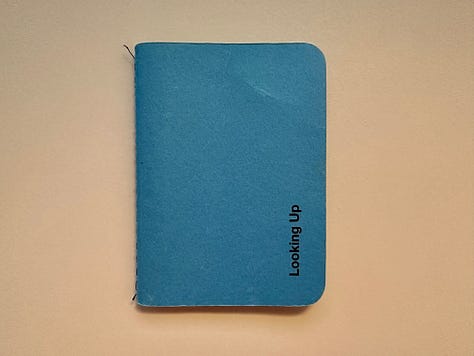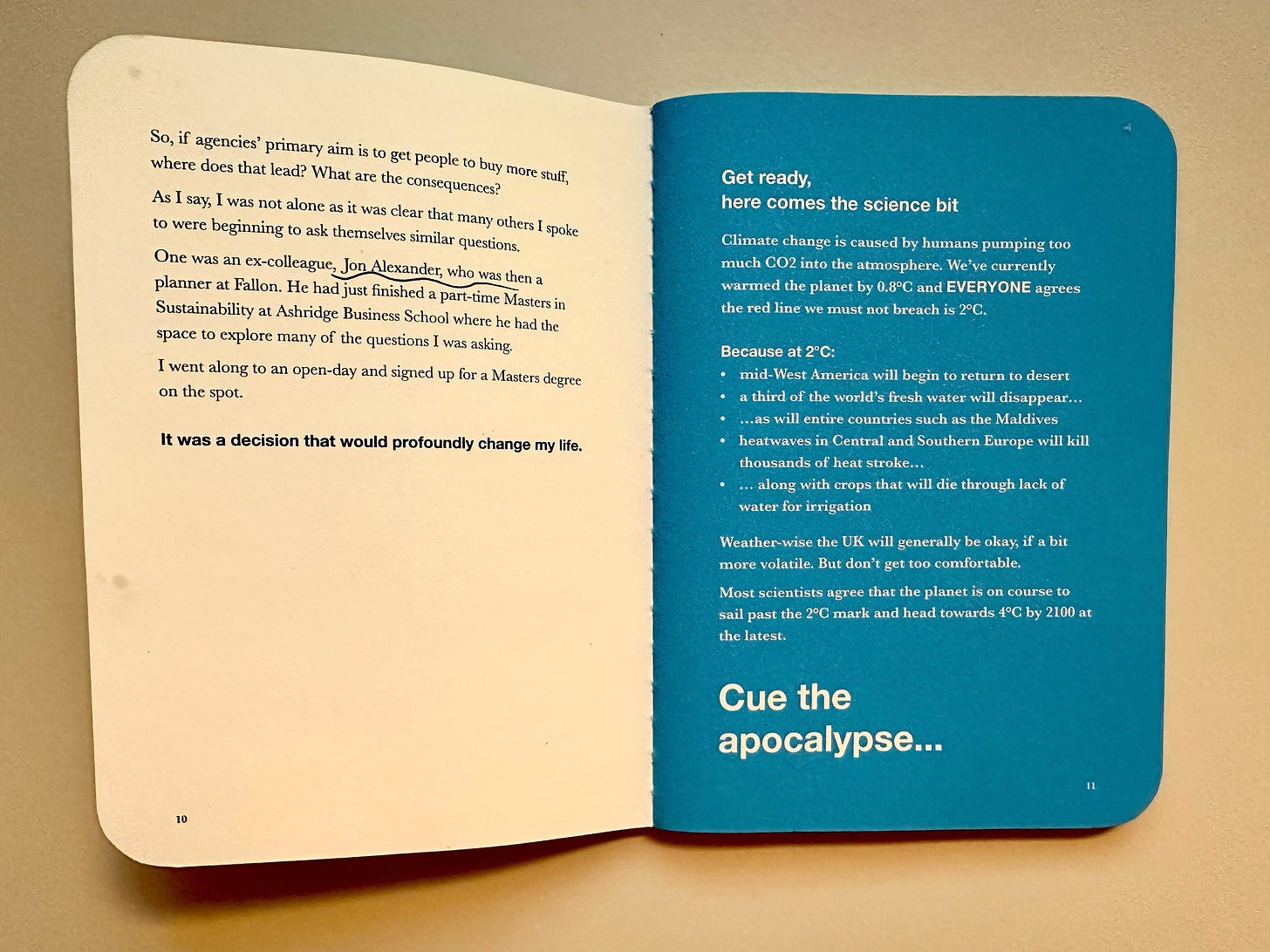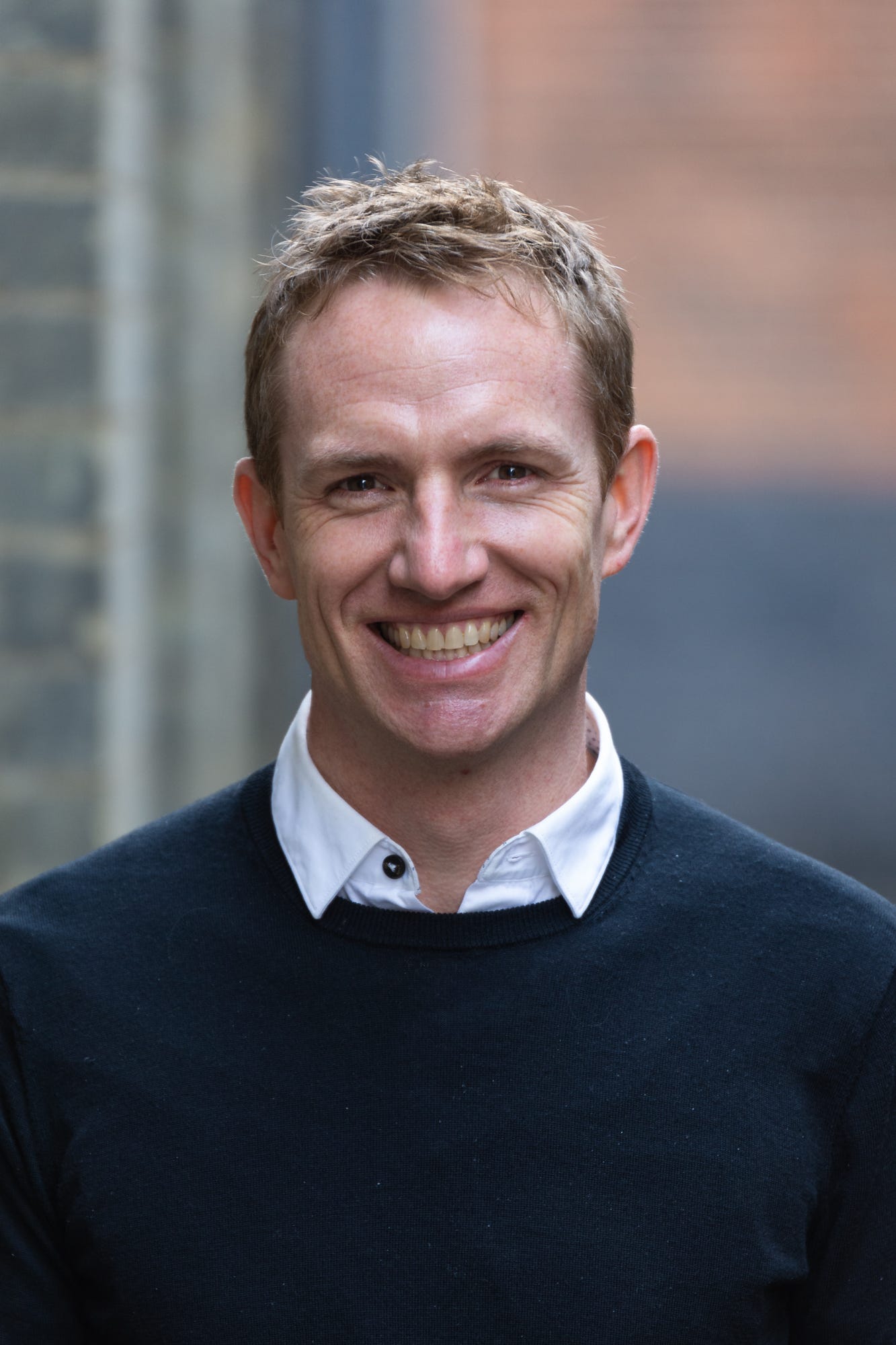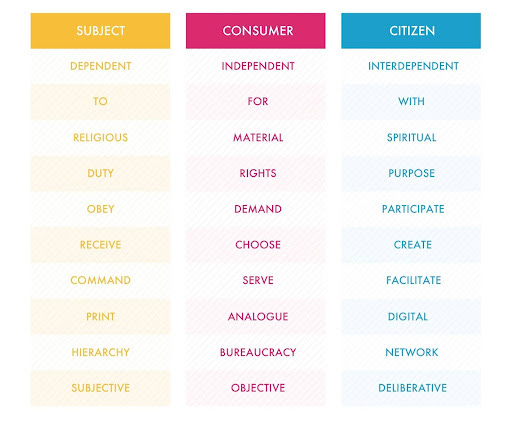Hello!
There’s a satisfying story behind today’s Q&A. We need to go back in time a bit.
Bear with me.
It’s London, early 2016. I’m less than two years into my first proper job at an ad agency, and I’m having doubts. I love the non-corporate culture and creative challenges of agency life, but something about helping big global brands sell more stuff just isn’t sitting right. Eventually, I confide in a colleague I suspect might feel the same. He tells me he’s got something that might help and returns the next day with a small, light blue bound book:



The book is called Looking Up. Its author is Jonathan Wise, a former ad man on a mission to shift agencies away from being morally neutral. If I like the book, my colleague tells me, I should join him at Jonathan’s next ‘Beers for Good’—an informal gathering for ad folks to contemplate their careers, conveniently hosted at a nearby pub. A few weeks later, there we are—cheap G&Ts and salted peanuts in hand. Jonathan gives an inspiring welcome before handing over to the guest speaker, and I whisper to my colleague that we’ve joined Advertisers Anonymous.
By the end of the night, I’ve traded my scepticism for enthusiasm. I’m so inspired by the talk I’ve heard and discussions we’ve had. Right before we leave, my colleague and I agree to join an ideation workshop organised by the then Greenpeace U.K. Head of Comms, James Turner. James wanted to start a collective for creative people to use their skills for good, and he’d come to Beers for Good to find his first recruits. The collective was called Glimpse, and all we needed to do was show up with an open mind.
So we did.
At the workshop, James’ brief was simple: come up with an idea to help citizens question the role of advertising in public space. My colleague’s group hit on something wild and wonderful: The Citizens Advertising Takeover Service, aka C.A.T.S.—a multi-week campaign that would exchange ads on the London Underground with pictures of furry felines.



6 months and a £23k Kickstarter campaign later, C.A.T.S. became worldwide news.
Fast forward to Stockholm, late 2023. It’s Saturday morning, and I’m scrolling through my inbox. An article in Psyche on “how to be a hands-on citizen” piques my interest, and the author’s name looks strangely familiar. Jon Alexander. I’m trying to rack my brain.
Eventually, it comes to me: Jon was the guest speaker at Beers for Good! I dig out the small blue book from the back of my bookshelf, and get my confirmation:
In 2016, Jon was early into his new career at New Citizenship Project (NCP), which he co-founded after deciding to leave advertising. Since then, NCP has gone on to work organisations and institutions including the Co-op, The Body Shop, National Trust, BBC, European Central Bank, and many more. Jon has also written Citizens: Why the Key to Fixing Everything is All of Us—heralded "an underground hit" in the Financial Times and selected for the World Economic Forum’s CEO Book Club.
Why am I telling you this story instead of just sharing Jon’s bio? Because I think it encapsulates everything Jon believes in: community, creativity, and storytelling as tools for positive change.
We have more power than we think. Thank you, Jon, for dedicating your career to spreading that message.
The musician Brian Eno wrote the forward to Citizens. How did that come about?!
Ha, nice first question! I wanted to practise what I preach with the book so I set up a mailing list once I knew I had a book deal, and put out various asks for help. I crowdsourced the title using a little tool called AllOurIdeas, asked for help with tricky content decisions, that kind of thing. One email basically said, "I'm no one, and it would really help the book if someone who was someone would write me a foreword—does anyone know anyone?!" It turned out a friend of a friend had just started working with Brian, and two weeks later, I was chatting through the ideas with him in his studio! You can watch Brian interviewing me about the book here.
Two words seem central to the thesis behind Citizens: paradigm and story. Can you explain why they are important?
I hold two core beliefs about humanity. First, we are Citizens by nature: collaborative, creative, caring creatures who can and want to shape the world for the better. Second, we are both storytelling creatures and story-dwelling creatures. We need deep structural stories—which is also what I understand the word "paradigm" to mean, I use these two almost interchangeably—to help us make sense of ourselves, to tell us who to collaborate with, what to create, who to care for. Some stories are better, truer, more useful than others. Power at the level of the story can be abused, and seeing these stories is essential to making the kind of fundamental changes we need.
As such, the core offer of the book is a way of seeing the moment in time we're living in through the lens of three competing stories related to the role of the individual in society: The Subject Story, The Consumer Story, and The Citizen Story.
The Subject Story tells us to do as we're told by the god(s)-given few who run society, who know best, and will lead us. The Consumer Story tells us to pursue self-interest on the basis that it will add up to the collective interest. The Citizen Story is rooted in the idea that all of us are smarter than any of us, that the right thing to do is to contribute your ideas, energy, and resources, and to encourage others to do the same.
If you've not got time for the book, the table above kind of does it!
I prefer to think of Citizenship as a muscle we all have because it's who we are by nature, but we just haven't been using it that much because the Consumer Story has told us to stay sat on the sofa…
If the Consumer Story has been the dominant paradigm for 80+ years, humans have a lot of unlearning to do. Our definition of 'citizen' is a good example. You talk about how we've come to understand it in terms of status and that only the civic responsibility we recognise is voting. How do we start to unlearn these deep-rooted notions—first, individually, and second, at scale?
I don't quite see it like that—I don't think we have to unlearn Consumer-ing and then learn Citizen-ing anew in stages. Certainly, at the individual level, I prefer to think of Citizenship as a muscle we all have because it's who we are by nature, but we just haven't been using it that much because the Consumer Story has told us to stay sat on the sofa… When you start using that muscle, you enjoy it, you develop the habit, it builds, and you get stronger.
At scale, I think there's another kind of challenge: the really difficult one. All our institutions are built out of the Consumer Story, so they repeat and reinforce it constantly, telling us to stay on that sofa and wait to be served. We are starting to see the institutional change and renewal we need, like the fact that Paris now has a permanent, randomly selected Citizens' Assembly as part of its governance structure, which decides the theme for 100 million euros a year of participatory budgeting, or Wales' Commissioner for Future Generations. But we're going to need that kind of thing to accelerate fast.
That's why I wrote the book the way I did—it's primarily aimed at people in positions of power and influence who could lead the reorientation of their institutions around the idea of people as Citizens not Consumers. We need a different kind of leadership if we're really to be able to face the challenges of our time.
Your book highlights many beautiful examples of "ordinary" citizens reclaiming their agency and creating change. Can you share a favourite and explain why you chose it?
I think it has to be Kennedy Odede, the founder of Shining Hope For Communities (SHOFCO). Ken started life in the hardest of circumstances as a street kid in Kibera, one of Nairobi's largest slums. He got hold of a football and started building community—getting people together first to play, then to clear the streets, before eventually pooling resources to do more and more.
Fast forward a decade, and SHOFCO has supported well over 2 million people through COVID-19 through its community clinics and schools network. The whole spirit has been about people coming together to solve their own challenges and only allowing funds and resources to come in behind that on the community's terms. It's being talked about as a new paradigm of development called Locally Led Development.
My favourite update since publishing the book is that Ken was invited to Davos as a social entrepreneur, decided it was stupid and that was really needed was a World Communities Forum instead of a World Economic Forum, and is now starting one!
"Our problem, our solution" is a trend among the citizen examples you highlight. What are the pros and cons of citizens adopting this attitude?
The pros, I think, are pretty obvious. It's about agency rather than charity, and that's just way more powerful systemically for all sorts of reasons. I really hate the so-called Effective Altruism (EA) movement for that reason: I think it's the antithesis of a Citizen approach, pretending that you can assess the impact of everything without getting up close and involved; it's just so clearly ignorant of any system impacts or complexity whatsoever. I like to call EA "the change you can buy."
The con of "our problem, our solution"—or rather the risk of it— takes us back to the challenge of institutional change. Ultimately, these approaches have to connect into new institutional structures and frameworks, and "our problem, our solution" implies you can parcel that down and just fix anything from where you are. It risks ignoring the reality that many problems are being created a long way away. We have to distribute power, but that means we have to open institutions up and reinvent them to sustain and support that distributed power—and not compete with it and crush it.
What's your advice for becoming a better citizen?
Buy my book! Kidding. It's basically three steps:
First, spot the story. Pay attention to where Subject, Consumer, and Citizen narratives show up in your life and when you inhabit which logic. Seeing them is essential to be able to shift them.
Second, choose "home." Identify a community you care about and have agency in, such as a community of place, profession, or passion.
Third, find the others. Show up, make connections, and invest in the relationships.
That's it, because the rest will follow. I joke about buying my book, but it's funny how this kind of question tends to push towards one-off transactions. In reality, it's all about relationships.
How can the tech and non-profit sectors come closer together?
I would love for these two worlds to come together around the idea that technology actually could save us if we change the logic on which we build it.
A good example of what I mean by this is the Sharing Economy. For a while, I thought the Sharing Economy would save us all by turning every transaction into a relationship. It had the potential. Instead, it turned a whole load of relationships into transactions. It made us Consumers not just of businesses but of each other—because it was based on the logic of the Consumer Story.
Marshall McLuhan famously said, "First, we shape our tools, and then our tools shape us." He was right, I think. Right now, if we build and apply AI out of Consumer logic with commercial Consumer business and governance models, we're utterly screwed. But if we build and apply it out of Citizen logic, with Citizen purposes and Citizen governance, the positive impact could be astonishing.
Which three books have impacted you most and why?
Together: A Manifesto Against the Heartless World by Ece Temelkuran — for making me understand that this work is all about having faith in humanity.
Zen And The Art Of Motorcycle Maintenance by Robert Pirsig — because reading it was the first time I saw that it was possible to see the world very differently.
Parables of the Talents by Octavia E. Butler — for showing that humans will still be Citizens, even in an undesirable future.
More questions for Jon? Join the mailing list on his website or hit him up on LinkedIn.
Thanks so much for reading!
Lauren






